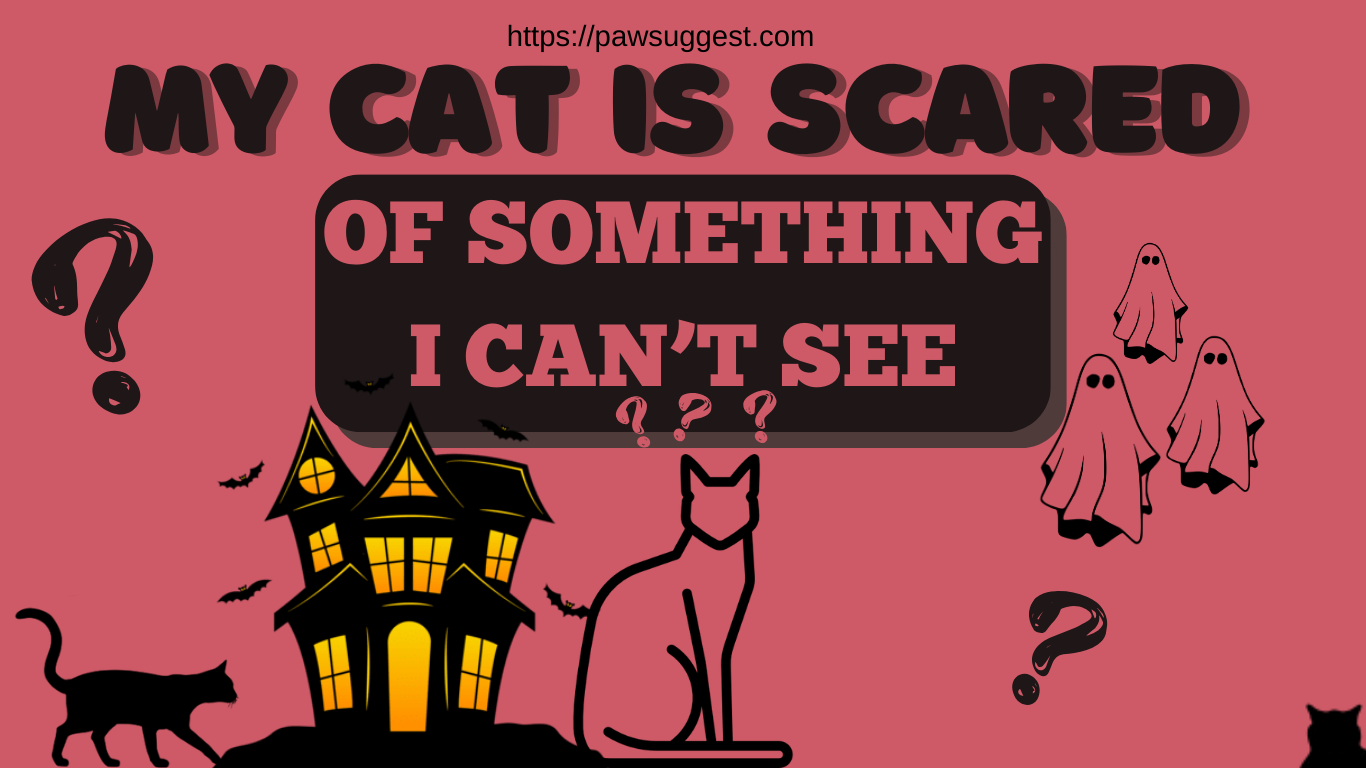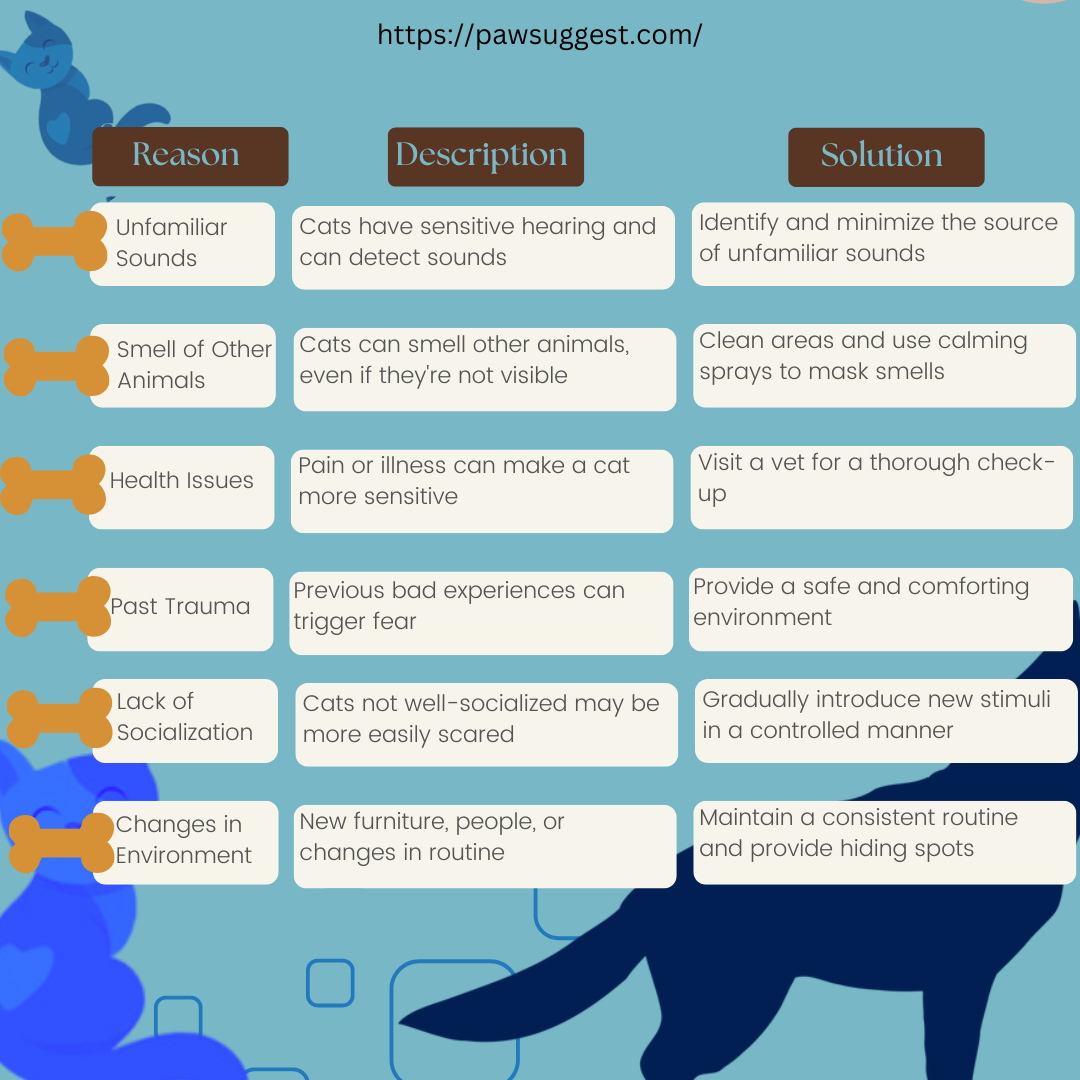It’s a tale as old as time—cats can see ghosts, right?
While this is perhaps an ideology stemming from myth and fable, there may be some truth. After all, cats can use their senses in ways we can’t directly fathom.
So, if your cat is seemingly scared, but you don’t see anything. You’re wondering why my cat is scared of something I can’t see?
Let’s take a closer look at this topic together!
Why My Cat Is Scared Of Something I Can’t See
There’s a reason why the phrase “scaredy cat” was created. When your cat acts like a scared cat without any apparent reason, it is rather fitting.
But is your feline simply misbehaving?
Perhaps not.
We need to consider the world from a cat’s point of view to comprehend this issue better.
Cats are delicate animals that are quickly agitated. They are more nerve-wracking than humans, and their senses can pick up on things that cat owners were completely unaware of.
In their world, cats seek food and flee from predators primarily using their senses of smell, sight, and hearing. Your indoor cat has the same level of awareness even though it has a butler.
Reasons Why My Cat Is Scared
Here are some possible reasons that could be spooking your cat suddenly.
1. Unfamiliar or odd smell
A cat’s nose plays a big role in defining its world. Their noses are over 14 times more sensitive than human noses.
A cat’s nose is not only susceptible, but it can also dissect a smell into its components. For instance, roasted meat is the most overpowering smell of a grilling BBQ.
Your cat can sense smells, including those of pepper, garlic, spices, honey, and other components used in the marinade.
Cats mark their territory with urine and utilize smell to recognize other cats. It’s possible that your cat needs to smell neighboring wild animals or other roaming cats’ pheromones.
Although cats can detect smells up to 150 feet (45 meters) away, you won’t be able to determine the source of your terrified cat’s nasal senses.
2. Personality
Naturally, some cats are more shy than others. Once their surroundings change repeatedly, they may become extremely anxious or frightened. Anxious cats often exhibit increased reticence towards physical contact and may only come out when they feel safe.
It may not always be bad in the house if your cat is inherently more prone to exhibiting anxious behaviors. However, what they’re going through is simply too stimulating for them.
3. Unusual Sounds
Humans cannot hear some frequencies, but cats can. Cats are notable for hearing the frequencies at which rats, mice, and other rodents interact and make noise. Cats have a hearing frequency range of 48 Hz to 85 kHz. This is significant because it enables animals that see these creatures as prey to locate their target during a hunt.
As a result, your cat might occasionally exhibit behaviors you find puzzling or seem extremely interesting. For instance, they might paw at a wall or a closet, which might confuse us. But perhaps your cat is picking up on sounds that we aren’t picking up on!
4. A New Family Member
Has your cat recently met a new family member or a pet? If so, your cat might not accept the new pet or visitor. The majority of cats are creatures of habit and enjoy routines. A cat may behave strangely in response to anything that could seriously disturb its regular routine.
The cat will need to acclimatize to new sounds and smells due to the presence of a new person or animal. It takes cats a while to adjust to change. As a result, until kids grow used to them, they can be afraid of these new alterations.
Many pet owners rush to introduce their cats to new people or animals. It’s essential to consider your cat’s comfort level when pacing the socialization process.
Signs of a Scared Cat
● Freezing in Place
Being quiet and graceful animals is quite beneficial to cats regarding hunting. When they perceive impending danger, they also employ this. Until they are sure that the source of their anxiety is far enough away for them to flee, they freeze and remain motionless.
● Running and Hiding
A cat will flee for safety if it thinks it has enough time to get out of harm’s way.
● Aggressiveness
A cat will not think twice about swiping at something with its paw, potentially exposing a claw if it perceives that the source of possible harm is close at hand. After the first paw swat, the cat will typically flee and hide.
● Dilated Eyes
When a cat experiences fear or excitement, its eyes dilate physiologically, allowing more light to enter and momentarily expand its vision field. Consequently, if a cat has mostly black eyes, its pupils are most likely dilating in fear.
● Flattened Ears
Similar to their dilated eyes, cats’ flattened ears—also known as ‘airplane ears’—are their natural reactions to danger and terror.
What to Do if Your Cat Seems Scared
Even though you can’t see anything, you now have a clearer sense of what might be frightening your cat. Most of the time, you won’t be able to pinpoint their precise fear. Therefore, your only option is to wait for your cat to get over it.
Most of the time, scared cats can try to acclimate to whatever new change makes them feel scared or withdraw to a quiet place to calm down.
It’s crucial to keep in mind that a scared cat can become aggressive very quickly, so trying to comfort your cat while they’re afraid of something physical could backfire.
Giving your cat the time and room is ideal in a scenario like this. They are required to adjust to their surroundings and come out of hiding again at their own pace.
Frequently Asked Questions (FAQs)
1. My cat seems to be seeing things, but why?
Looking around, as you say, could indicate that she has a behavior or fear issue, that she is not feeling well, or that something is interfering with her nervous system.
2. Why is my cat staring at nothing and scared?
The most likely reason for cats staring at something that appears to be invisible is that they are tracking or hunting prey that is invisible to humans.
3. Do cats see things we don’t see?
You would probably be seeing more than you do now if you could see the world through your pet’s eyes. It’s possible that cats can perceive things that are invisible to human vision.
Summary
Ultimately, our cats’ perception of the world differs significantly from our own. Although we still don’t fully comprehend how they see the world, science has discovered fascinating facts about our differences.
Your cat may observe something humans cannot see if they appear afraid. It’s better to attempt to determine what’s frightening your cat and, if that’s not feasible, try to find a solution.
Related:
Decoding: Cat Behavior Changes After Abortion
Inverted Nipple on Cats: Quick Guide for Pet Owners



